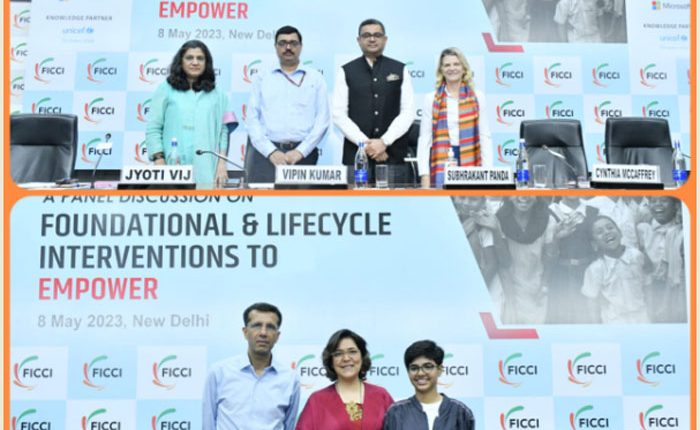Ministry of Education in discussions with state governments to identify vocational education requirements for specific geographical areas and industries
Says Vipin Kumar, Additional Secretary, Department of School Education and Literacy, Ministry of Education at IDEATE 2023
~Experts and leaders from the government, civil society, industry associations, development agencies and corporates convene to discuss crucial strategies for empowering India’s 240 million adolescents.
New Delhi(Kalinga Voice): “Government of India, emphasized the importance of providing quality education to girls in India, focusing on vocational education as a means to ensure employability and relevance to the demands of the industry” says Shri Vipin Kumar, Additional Secretary, Department of School Education and Literacy, Ministry of Education, Speaking at the 12th edition of IDEATE 2023, a Bansidhar & Ila Panda Foundation initiative in partnership with FICCI and UNICEF as knowledge partner .
Emphasizing that vocational education is a crucial aspect of the National Education Policy (NEP) 2020, Shri Kumar added that NEP emphasises the importance of providing 21st-century skills to girls to participate in the economy. “To achieve this, the Ministry of Education is in discussions with state governments to identify requirements for specific geographical areas and industries“, he said.
Alluding to the government’s ambitious target for girls’ education, he noted that “at least 50% of girls who are passing out from the 12th standard by 2025-26 should be expert in one skill relevant to the job market.” In this regard, he sought industry support in providing internships.
The 12th edition of IDEATE 2023, organised under the auspices of G20 Empower Jan Bhagidari, themed “Foundational & Lifecycle Interventions to EMPOWER,” brought together policymakers, industry leaders, and experts to discuss transformative strategies for empowering India’s adolescent girls – a demographic representing a quarter of the nation’s population.
In his welcome address, Subhrakant Panda, President of FICCI and Trustee at BIPF, highlighted the importance of investing early in adolescent development. He said, “India has the largest adolescent population in the world, with every fifth person in the 10-19 age group. Given that approximately 47% of this cohort are girls, the need of the hour is their technical and educational upliftment so they go on to have skillsets which enable them to tackle any challenges and be equal partners in India’s progress.”
Mr. Panda emphasised the importance of closing the gender gap in education, health, and job opportunities, boosting economic growth and inclusivity. With young women joining the workforce, society as a whole benefit. It is estimated that if adolescent girls continue their education, delay early marriage, and avoid early pregnancy, they could add around $110 billion to India’s GDP over their lifetimes, he said. Mr. Panda urged a holistic approach, focusing on empowerment by seeing women as agents of change rather than just beneficiaries of health and development programs.
Delivering the keynote address, Cynthia McCaffrey, UNICEF India Representative, emphasized on a multi-sectoral approach to empowering young women and girls. “Getting to the root causes and barriers holding girls back in the digital age needs to be addressed from all aspects. It is not just about closing the gender gap, but also about creating a generation of innovators, creators, and leaders to shape a more inclusive and equitable society. Adopting a multi-sectoral approach, working together with businesses, we need to ensureearly access to technology, digital, and life skills training. We need to redouble efforts that address harmful gender stereotypes within and outside families including online abuse,” she said.
“UNICEF works with the government and other partners, to equip adolescent girls and boys with skills for the workplace while promoting access to quality healthcare, education, social benefits and child protection,” added Mc Caffrey.
During the event, Trustee and CEO of the Bansidhar and Ila Panda Foundation, Ms. Shaifalika Panda, hosted a fireside chat on mentoring across the lifecycle of girls and featured panelists Ashish Dhawan, Founder CEO, The Convergence Foundation, and Manya Mishra, Youth Icon. The conversation explored the creation of a progressive adolescent ecosystem and the importance of mentoring from childhood to adulthood. She said, “An inclusive environment that promotes equity for girls from their foundational years will foster an environment where they will build the necessary skills and confidence for an independent outlook. Mentoring them across their lifecycle will empower them to follow their dream and achieve their full potential – creating a more equitable and just society with a high percentage of women’s economic representation.“
Alluding to gender inequity across various segments, which prevents a majority of girls from having a level playing field, she highlighted the crucial need to create an environment that supports and empowers girls, allowing them to unlock their potential. In this regard, Ashish Dhawan outlined several areas, including addressing skill deficits, building strong networks, promoting role models, and challenging social norms, among others, requiring attention.
Ms. Jyoti Vij, Additional Director General, FICCI, delivered the concluding remarks at the event.
In addition, a panel discussion titled “Empowering Girls during the Foundational Years” was moderated by Namita Bhandare, Independent Journalist & Writer. The panelists, including Osama Manzar, Founder & Director, DEF (Digital Empowerment Foundation); Maharshi Vaishnav, CEO, Educate Girls; Praveen Kumar Karn, Head – Group CSR, Spark Minda Group; Shipra Jha, Gender Specialist, UNICEF and Anita Kujur, Student of Medicine delved into the importance of sustained efforts in education, life skills, health, hygiene, digital skills, livelihood opportunities, capacity building, and nurturing family and mother-child health.
The objectives of Ideate 2023 included addressing policies and frameworks for the empowerment of adolescent girls, assessing the impact of diversified culture and practices on foundation years, understanding the role of influencers in creating a progressive adolescent ecosystem, and exploring mentoring through all stages from childhood to adulthood.
The event reaffirmed the commitment of various stakeholders to invest in gender equity, autonomy, and empowerment of adolescent girls as a fundamental step towards achieving the Sustainable Development Goals and the G20 EMPOWER track.

